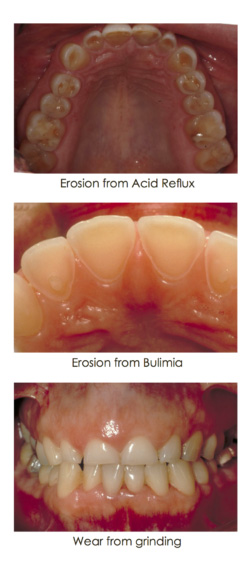Tooth Wear
Tooth Wear Treatment & Prevention provided by Dr. Djawdan
in Annapolis, MD at Djawdan Center for Implant and Restorative Dentistry
 Tooth wear is the loss of healthy structure for reasons other than decay. Although no cavities are present, teeth become shorter and often thinner over time. Tooth wear may decrease proper chewing ability and may also noticeably change the appearance of your smile. Tooth wear is the loss of healthy structure for reasons other than decay. Although no cavities are present, teeth become shorter and often thinner over time. Tooth wear may decrease proper chewing ability and may also noticeably change the appearance of your smile.
FREQUENTLY ASKED QUESTIONS
| 1. |
What causes Tooth Wear?
Tooth wear is not normal. Three causes for tooth wear have been identified:
| 1. |
Acid erosion which appears as grooving or dishing of the biting surface of your teeth. The risk factors for acid erosion are:
| • |
Chronic dry mouth
|
| • |
Chronic vomiting or "GERD" (Gastroesophageal Reflux Disease)
|
| • |
Diet - sports drinks, soft drinks, candies, citrus fruits
|
| • |
Environment - certain acidic work places, swimming pools |
|
| 2. |
Bite wear which appears as shortening or thinning of your teeth. The risk factors for bite wear are:
| • |
An unblanaced bite - your teeth should contact evenly on both sides
|
| • |
Grinding your teeth
|
| • |
An overly abrasive diet |
|
| 3. |
Tooth cleaning abrasion which appears as notching near the gum line of your teeth. The risk factors for tooth cleaning abrasion are:
| • |
Abrasive dental home care aids such as some toothpastes and toothbrushes
|
| • |
Using too much pressure on your toothbrush or toothpicks when cleaning your teeth |
|
|
| 2. |
What can I do to minimize my risk of future Tooth Wear?
The first step in addressing tooth wear is to have your dentist evaluate your individual risk factors and customize an appropriate management protocol for you.
Your tooth wear management protocol may include:
| • |
Diagnosing and managing chronic dry mouth
|
| • |
Diagnosing and treating conditions related to chronic vomiting and GERD
|
| • |
Customized dietary counseling
|
| • |
Diagnosing and treating an unbalanced bite
|
| • |
Making a mouthguard to protect your teeth from grinding
|
| • |
Customized dietary counseling
|
| • |
Mineral applications to your teeth such as fluoride to harden the notched surfaces
|
| • |
Customized home dental care instruction |
|
| 3. |
What will happen if I choose to do nothing about my Tooth Wear?
Other than impacting the way you look, untreated tooth wear may lead to the nerve of your tooth being exposed. When this occurs, the affected tooth will require root canal treatment to save it. If tooth wear remains untreated, it can lead to the tooth becoming damaged to the extent it must be removed. |
If you're concerned about tooth wear, feel free to bring it up during your dental consultation. You can set up your first appointment with the Djawdan Center for Implant and Restorative Dentistry by contacting us or calling us at 410-266-7645. |
 Tooth wear is the loss of healthy structure for reasons other than decay. Although no cavities are present, teeth become shorter and often thinner over time. Tooth wear may decrease proper chewing ability and may also noticeably change the appearance of your smile.
Tooth wear is the loss of healthy structure for reasons other than decay. Although no cavities are present, teeth become shorter and often thinner over time. Tooth wear may decrease proper chewing ability and may also noticeably change the appearance of your smile.